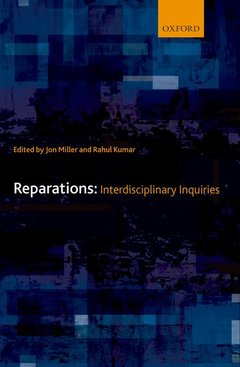Description
Reparations
Interdisciplinary Inquiries
Coordinators: Miller Jon, Kumar Rahul
Language: English
Subjects for Reparations:
Publication date: 02-2007
368 p. · 16x24 cm · Paperback
368 p. · 16x24 cm · Paperback
Description
/li>Biography
/li>
Reparations is an idea whose time has come. From civilian victims of war in Iraq and South America to descendents of slaves in the US to citizens of colonized nations in Africa and south Asia to indigenous peoples around the world - these groups and their advocates are increasingly arguing for the importance of addressing historical injustices that have long been either ignored or denied. This volume aims to contribute to these debates by focusing the attention of a group of highly distinguished international experts on the ways that reparations claims figure in contemporary political and social justice movements. Four broad types of reparations claims are examined, those involving indigenous peoples, the legacy of slavery in the United States, victims of war and conflict, and colonialism. In each instance, scholars and activists argue about the character of the injustice for which reparations are owed, why it is important to take these demands seriously, and what form redress should take. The aim is not consensus but to exhibit better the complexity of the issues involved - a goal which the interdisciplinary nature of the volume furthers - as well as the importance of taking seriously both conceptual issues and the actual politics of reparations.
Jon Miller is an assistant professor of philosophy at Queen's University (Canada). Apart from reparations, he works on early modern rationalism and the Hellenistic era of ancient philosophy. His next major project will be to understand better how and why philosophical conceptions of happiness changed during the early modern era. Rahul Kumar is an associate professor of philosophy at Queen's University (Canada). He works mainly in moral and political philosophy. His current research concerns questions in non-consequentialist moral theory and intergenerational ethics.
© 2024 LAVOISIER S.A.S.
These books may interest you

Enduring Injustice 27.67 €

Enduring Injustice 92.03 €

The Case for Gay Reparations 28.98 €

